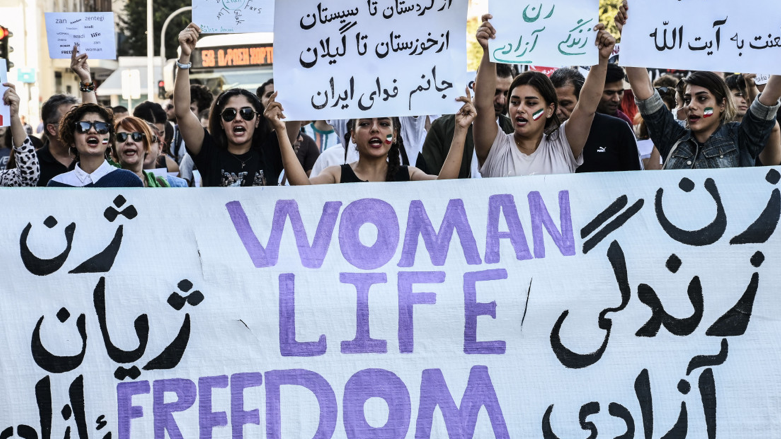US honors ‘Women and Girl Protestors of Iran’ in Madeleine Albright Award

WASHINGTON DC, United States (Kurdistan 24) — In honor of International Women’s Day on Wednesday, the State Department and White House joined together to recognize eleven women of exceptional courage.
A new award—the Madeleine K. Albright Honorary Group Award—was given for the first time. As the State Department explained, that award was dedicated to “the women and girl protestors of Iran.”
“The September 16 death of Mahsa (Zhina) Amini, visiting Tehran from her home in Kurdistan, while in the custody of Iran’s so-called ‘Morality Police’ sparked months of grassroots, women-led protests across Iran’s 31 provinces,” the State Department announcement began.
“Iran’s state-sponsored violence against women has a long history,” it continued, “yet Amini’s brutal killing touched a nerve in Iranian society, galvanizing a protest movement.”
Following her death, “Iranian women and girls took to the streets, removing and cutting their hair,” it said, and “their courage and defiance inspired waves of others to join them en masse.”
In 2016, five Iraqi women, including a Dohuk-based Yazidi doctor, Dr. Nagham Nawzad, were among the women honored for their courage in the annual award.
Earlier this week, the French Ministry for Europe and Foreign Affairs extended a similar award to Dr. Nawzad.
Read More: French Foreign Minister honors Yazidi doctor
Madeleine Albright
Albright became Secretary of State in January 1997, as Bill Clinton began his second term. She was the first woman to hold that position, succeeded eight years later by Condoleezza Rice, who became America’s second female secretary of state in 2005, as George W. Bush’s second term began.
Albright replaced Warren Christopher, who had been deputy secretary of state under the Democratic president, Jimmy Carter, who served only one term. Carter was widely seen as a weak figure, humiliated by the Iranians, who seized the U.S. embassy in November 1979 and held 52 Americans hostage over the next year, releasing them only after a new U.S. president—Ronald Reagan—took office.
The Democrats did not return to the presidency for another 12 years—until Bill Clinton took office in January 1993. That was a mere two years after the 1991 Gulf War that drove Iraqi forces out of Kuwait. In the 1992 presidential campaign, Clinton complained that his rival, President George H. W. Bush, should have ousted Saddam Hussein during that war.
Once Clinton was elected, however, he did not want to deal with any problems associated with Iraq. Rather than address those issues, he swept them under the rug, as if no serious issues were involved.
Indeed, already in January 1993, after a skirmish between the outgoing president and shortly before taking office himself, Clinton advised The New York Times that he was not “obsessed” with Saddam, and if the Iraqi leader wanted “a different relationship” with the U.S. president, he should “change [his] behavior.”
Clinton’s first secretary of state accommodated, even perhaps, shared, his disinclination to deal with the unresolved issues concerning Iraq that followed the Gulf War. However, Albright was different, and she undertook an important diplomatic initiative on behalf of the Kurds.
In the context of the stalemate that followed the Gulf War, the two main Kurdish parties—the Kurdistan Democratic Party (KDP) and Patriotic Union of Kurdistan (PUK)—fell into fighting one another.
In 1998, however, Albright helped mediate an end to the intra-Kurdish conflict. She passed away last year, and the Kurdistan Region Prime Minister Masrour Barzani honored her then, affirming she had “helped end the Kurdish civil war and reconcile our differences, closing a bitter chapter that had touched far too many people.”
Read More: PM Barzani extends condolences over former US Secretary of State’s death
